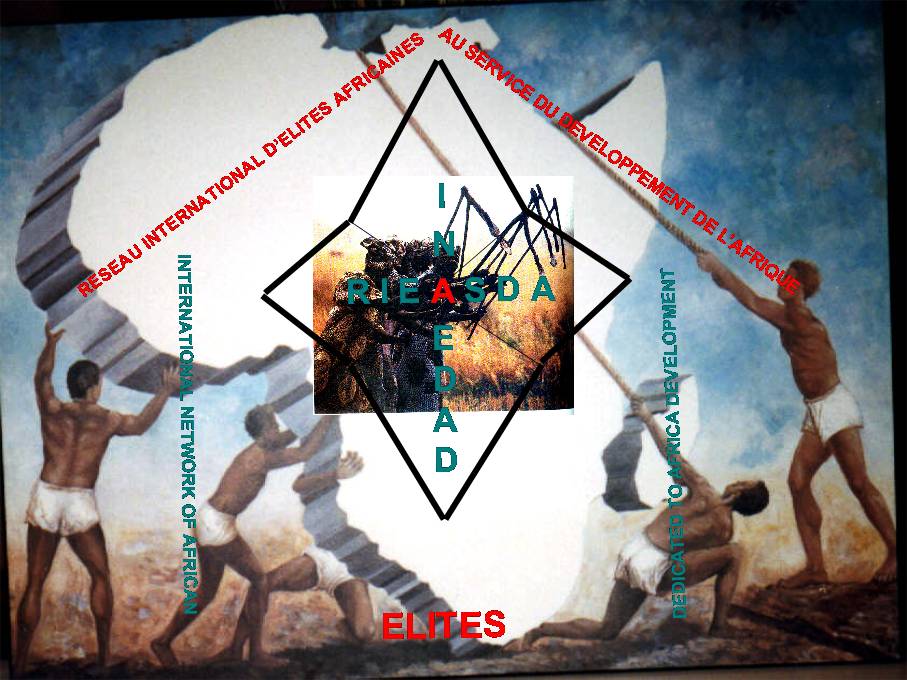INTERNATIONAL NETWORK OF AFRICAN ELITES DEDICATED
TO AFRICA’S DEVELOPMENT

INAEDAD
Member Code of Conduct
Purpose of the Code
The primary concerns of INAEDAD are our mission, and
our members. INAEDAD is dedicated to Africa’s development (Social,
economic, political, scientific, professional) as well as the development
of ethically sensitive and responsible Elites or persons. It seeks to
achieve these goals through sound development projects in Africa for the
peoples of Africa, professional training, promotion and through regulations
and policies governing conduct that encourages independence, productivity,
maturity and respect for the rights and viewpoints of others.
Conduct at non-INAEDAD-activities is viewed as the members’ personal
business. Conduct at INAEDAD-activities or a sponsored INAEDAD -event
is expected to be in accordance with this Member Code of Conduct (hereafter
referred to as “the I-RCode”). INAEDAD reserves the right
to impose disciplinary sanctions or take other appropriate action when
conduct is not in accordance with the Code.
This Code is in effect for chapter, regional, national, international
INAEDAD- activities. The following categories and examples of unacceptable
behavior are subject to disciplinary actions. INAEDAD reserves the right
to identify other behaviors not listed below. Such determinations will
be made by INAEDAD-RIEASDA Executive Board (I-REB). For INAEDAD activities
at chapter and regional/international events, Chapter or Regional Executive
Boards can make the determination with the consent of the I-REB.
Personal Misconduct
Unacceptable personal misconduct is defined as:
1. Harassing, physically threatening, or physically or verbally abusing
any person in the INAEDAD or at any INAEDAD sponsored function or event.
2. Conducting oneself in a manner endangering the health or safety of
another person.
3. Harassing any individual because of that person’s ethnic/tribal
group, race, color, gender, religion,
marital status, disability, sexual orientation, or for other reasons by:
- Intentionally subjecting another person to offensive physical contact
other than self-defensive.
- Specifically insulting another person in his or her immediate presence
with abusive words or gestures when a reasonable person would expect that
such act would cause emotional distress or provoke a violent response.
- Unwanted sexual behavior directed toward an individual,.
4. Engaging in lewdness or indecency.
5. Exhibiting disorderly conduct (including that resulting from drunkenness),
unreasonable noise, or behavior that results in unreasonable annoyance.
6. Tampering with safety systems (such as fire-fighting equipment), turning
in a false alarm, or engaging in behavior that constitutes a fire hazard.
7. Stealing any property.
8. Selling, brandishing, or possessing firearms, ammunition, explosives,
dangerous chemicals, or any other objects as weapons.
9. Defacing property, public or private.
Disruption
Disruption shall be defined as:
1. Creating noise or other disturbances that disrupt INAEDAD activities
or INAEDAD sponsored events, or that disrupt either participants or non-participants
at the venue of a INAEDAD -sponsored event.
Abuse of Controlled Substances
Controlled substances shall be defined as:
1. Intoxicants: The purchase, possession or consumption of alcoholic beverages,
illegal drugs and substances is regulated by State law. Members are expected
to know and abide by Province/State/Country law and by INAEDAD rules and
regulations. The following is not permissible:
2. Illegal Drugs and Substances: Members are not permitted to be under
the influence of, possess, manufacture, distribute, or sell illicit drugs,
as prohibited by Province/State/Country law, at INAEDAD -sponsored or
approved activities. Reasonable suspicion of possession or use of illegal
drugs and substances at INAEDAD activities and sponsored activities may
subject the person involved to investigation.
Disciplinary Authority
Violation of the Code may be reported by any attendee at an INAEDAD -sponsored activities. Such violations should be reported in writing no less than 10 days after the alleged occurrence. Violations should be reported to the Standards & Ethics Committee of INAEDAD Executive Board.
Violation of the Code
Violation of the Code may subject the member to disciplinary action, including suspension of membership or expulsion, as well as punishment in accordance with federal, provincial/State/Country or municipal law.
Warning
A warning constitutes administrative action that informs the member that he/she has violated the Code and that a record will be kept of that violation at INAEDAD Headquarters for one year. If a member who is on warning again violates the Code of Conduct, probation or more serious and formal disciplinary action will be taken.
Probation
Probation constitutes administrative action that informs the member in writing that he/she has violated the Code, and that a record will be kept at INAEDAD Headquarters for two years. The behavior of the member is expected to be exemplary during the two-year probation period. Any future charges against the member may be cause for suspension, expulsion, or more serious disciplinary action.
Restitution
Restitution constitutes reimbursement for damage to or misappropriation of property, which may take the form of direct financial compensation, of service, or other forms of indirect compensation. In the event that damage occurs as a result of a member’s action and that action represents a Code violation, the member will be held personally liable for restitution.
Suspension
Suspension is the exclusion from all INAEDAD sponsored activities for a period of one year. Records of suspensions will be kept on file for five years.
Expulsion
Expulsion is the termination of member status for an indefinite period. Records of expulsions will be kept on file for ten years
Readmission
Conditions for readmission, if any, shall be stated in the notice of expulsion. Readmission will be granted at the discretion of the INAEDAD Executive Board following a recommendation from the Standards and Ethics Committee.
